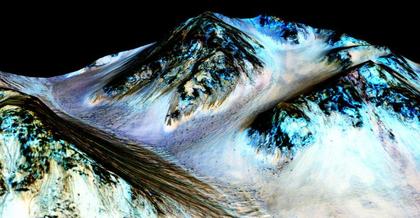-
Tips for becoming a good boxer - November 6, 2020
-
7 expert tips for making your hens night a memorable one - November 6, 2020
-
5 reasons to host your Christmas party on a cruise boat - November 6, 2020
-
What to do when you’re charged with a crime - November 6, 2020
-
Should you get one or multiple dogs? Here’s all you need to know - November 3, 2020
-
A Guide: How to Build Your Very Own Magic Mirror - February 14, 2019
-
Our Top Inspirational Baseball Stars - November 24, 2018
-
Five Tech Tools That Will Help You Turn Your Blog into a Business - November 24, 2018
-
How to Indulge on Vacation without Expanding Your Waist - November 9, 2018
-
5 Strategies for Businesses to Appeal to Today’s Increasingly Mobile-Crazed Customers - November 9, 2018
NASA Announces Discovery Of Free-Flowing Water On Mars
Using an imaging spectrometer on MRO, researchers detected signatures of hydrated minerals on slopes where mysterious streaks are seen on the Red Planet. Satellite images from Mars revealed narrow streaks, less than five meters wide, that “appear on slopes during warm season, lengthen, and then fade when conditions become cooler, according to Mirror UK”.
Advertisement
These “hydrated salts” are able to keep water from freezing even at temperatures as cold as -70 degrees Celsius.
NASA announced on Monday that liquid saltwater exists on the surface of Mars – a discovery that scientists say indicates the “potential” for life on the planet. Water means there’s a better chance of life on the planet. Instruments aboard NASA’s Mars Reconnaissance Orbiter have found that rivers of salt water flow down Martian hills in the summer.
Astrophysicists have long hypothesised that the seasonal streaks, dubbed “recurring slope lineae“, may be formed by brine flows on the planet. Scientists have theorized that more than 4 billion years ago, the Red Planet had enough water to fill lakes and rivers, though today’s findings show the most direct evidence of the water.
At a news conference this morning, scientists announced that Mars isn’t the dry, arid planet they once thought and that it does have a water cycle, although they don’t know where the water comes from.
Scientists say they’re not sure what this could mean for the future of Mars.
Writing in the journal Nature Geoscience, the scientists led by PhD student Lujendra Ojha, from the Georgia Institute of Technology in Atlanta, US, concluded: “Our findings strongly support the hypothesis that recurring slope lineae form as a result of contemporary water activity on Mars”.
Different soils sampled were found to be moist and full of water. “The presence of liquid water on Mars’ present-day surface therefore points to environment[s] that are more habitable than previously thought”.
“When most people talk about water on Mars, they’re usually talking about ancient water or frozen water”.
Advertisement
Said Grunsfeld: “I think all of the scientific discoveries we’re making on the surface of Mars … these observations are giving us a much better view that Mars has resources that are useful to future travels”.




























